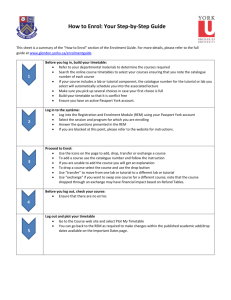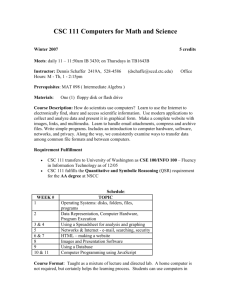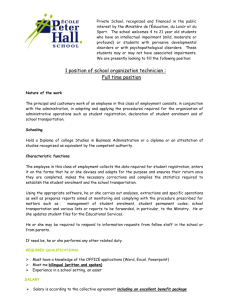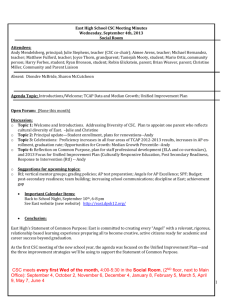Course Selection: Life Sciences, Computer Science, Physical
advertisement
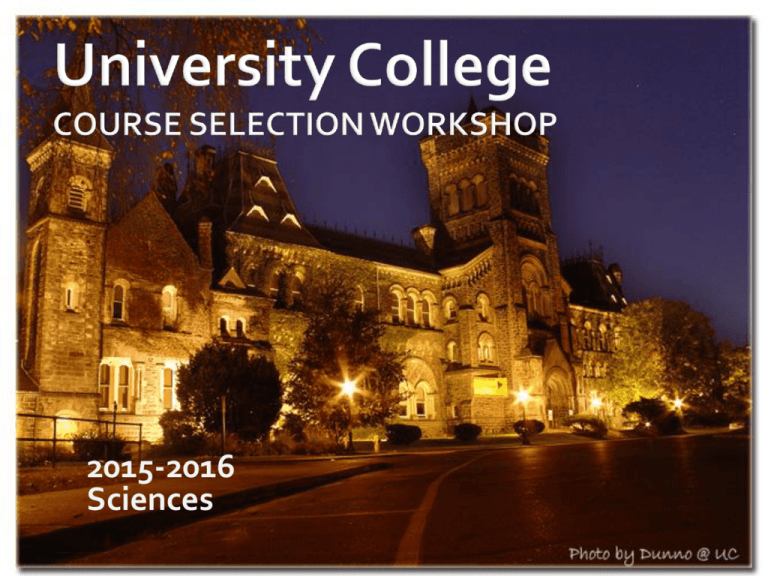
2015-2016 Sciences 1. Introduction 2. Materials for choosing courses 3. Steps to choosing courses 4. Important Dates 5. Registration & Fees 6. Keys to Success On the Arts & Science website: www.artsci.utoronto.ca New Students site 2. Academic Calendar 3. Registration Instructions and Timetable 1. www.artsci.utoronto.ca/newstudents Home Welcome Guide Calendar Next Steps Videos FASt Answers Next Steps Course Selection Program Information list of all programs and 1st year required courses www.artsci.utoronto.ca Programs and Courses Example: Anthropology Important Notices Code of Behaviour on Academic Matters Code of Student Conduct Grading Practices Policy Policy on Official Correspondence with Students Important Dates Drop deadlines Student Services & Resources Degree Requirements Breadth Requirements Rules and Regulations LWD, CR/NCR, GPA etc. Course code PHY131H1 Campus code indicator. 1 = course offered on the St. George campus Y 1.0 level credit, H = 0.5 credit First digit indicates = year PHY = Departmental Identifier Introduction to Physics I Course title A first university physics course primarily for students not intending to pursue a Specialist or Major program in Physical or Mathematical Sciences. Topics include, classical kinematics & dynamics, momentum, energy, force, friction, work, power, angular momentum, oscillations, fluids, viscosity. Prerequisite: MCV4U Calculus and Vectors/MHF4U Functions & Calculus Course Description Corequisite: MAT135H1/137Y1/157Y1 Lists courses you must have completed before you can Exclusion: PHY151H1 take PHY131H11 Lists courses that must be taken Lists courses with similar course Recommended Preparation: SPH4U Physics and SCH4U Chemistry concurrently with content. If you have taken a PHY131H1 course as an Distribution Requirement Status: This is a Science course Listslisted courses that are recommended by the exclusion, then you can’tas pre-requisites or coDepartment take PHY131H1 for credit requisites for PHY131H1, but not required Breadth Requirement: The Physical and Mathematical Universes (5) www.artsci.utoronto.ca Quick Links Timetable Listings Important dates Registration Instructions Detailed instructions on choosing your courses Explanation of codes, wait lists, how to use ROSI Fees information Timetable listings Evening courses 1st Year Seminars Courses not offered *Map and Building Codes* indicates Several Lecture, ‘F’‘H’ section code indicates 0.5 credit Practical andplace Tutorial course takes in First Meeting Sections to Term – Sept. to Dec. choose from. You must choose one of each type if offered (not Meeting Section codes every course offer time correspond towill specific Practical and Tutorial slots e.g. Lecture L0201 takes Meeting Sections) place on Tues. (‘T’), Thurs. (‘R’) and Fri (‘F’), from 12:10 till 1:00 p.m. (Classes begin 10 minutes after the hour and end on the hour.) Practical (lab) P0401 takes place on (‘R’) Thurs. from 2:10 till 5:00 p.m. A general location on campus is provided for first-year courses to assist you in planning your aacademic timetable. Avoid Some courses will offer Enrolment Indicators and Controls back-to-back East/West classes as it is waitlist option if the meeting give access to is a course specific difficult to travel across campus in the 10 section filled. Ato‘Y’ indicator groups of students specific times minute interval between classes means that for a waitlist function (A) Indicates that the Practical (lab) Meeting Section takes and some courses – those with is available on ROSI‘E’ place in alternate weeks, not every week. This may allow Enrolment Indicators cannot be you to create a more “efficient” timetable by selecting a added via ROSI/SWS Practical Meeting Section for a first-year science course that will alternate - in the same time slot - with a Practical Meeting Section in another first-year science course. e.g. CHM138H1 (F) P0201 (Tues. 2:10-5:00) will alternate with BIO120H1 (F) P0202 (Tues. 1:30-4:30). ( Refer to Timetable for more details. ) September ------------------------------- December January ------------------------------------------ April H Course Code (0.5 credit) H Course Code (0.5 credit) F Section Code = First Term S Section Code = Second Term Y Course Code (1.0 credit) Y Section Code = Full ‘Year’ (Sept. – April) Y Course Code (1.0 credit) Y Course Code (1.0 credit) F Section Code = First Term S Section Code = Second Term H Course Code (0.5 credit) Y Section Code = Full ‘Year’ (Sept. – April) CHM138H1F BIO120H1F Priority (P) for first-year Life Sciences students Lecture, Tutorial & Practical (lab) enrolment If you want to do your bi-weekly Chemistry lab on the same afternoon as Biology, see notes about alternating Practical sections (DIFFERENT DIGITS – e.g. P0101 & P0102) MAT135H1F Priority (P) for first-year Life Sciences and Math & Physical Sciences students Lecture, Tutorial & Practical (lab) enrolment If you want to do your bi-weekly Biology lab on the same afternoon as Chemistry, see notes about alternating Practical sections (DIFFERENT DIGITS – e.g. P0101 & P0102) Priority (P) for first-year Computer Sciences, Life Sciences and Social Sciences students Lecture and Tutorial enrolment EAS100Y1Y Special instructions for language courses 1. Review Degree requirements 2. Review Subject POSt/program options 3. Find your 1st year required courses 4. Consider your elective options 5. Check course descriptions in the Calendar 6. Check course information in the Timetable 7. Create a schedule with a list of courses and back up choices 8. Check the A&S website for any updates 9. Enroll on ROSI Combination of full and half credits. No time limit for the completion of a degree There are limits on the number of 100-level courses that can be used for credit towards your degree Subject POSts (Programs Of Study) are the focus of your degree and you should select a combination of firstyear courses that will give you the option toRequirements enter Breadth are several different “exit” requirements – they Subject POSts don’t have to at bethe completed in end of your first year your first year of study but are of study required for the completion of your degree. You have the option of completing either: one Specialist program (9.0 to 17.5 credits) or two Major programs (6.0 to 8.0 credits each) or one Major program (6.0 to 8.0 credits) plus two Minor programs (4.0 credits each) Students after You can complete moreadmitted than September 2010 the “minimum” number of doselect NOT complete The CGPA determines yourcan academic Subject POSts. You the Distribution statusup(e.g. Good Standing, On to 3InSubject POSts with a Requirement Academic Probation etc.) and your maximum of 2 large Subject eligibility to POSts graduate. Grades inor the low( e.g. Majors to-mid 60’s wouldSpecialists). provide a CGPA in the 1.85 range. Must take at least 4.0 credits from the following categories: take at least 4.0 credits from the following categories: 1. Creative and Cultural Representations (CCR) 2. Thought, Belief and Behaviour (TBB) 3. Society and Its Institutions (SII) 4. Living Things and their Environment (LTE) 5. The Physical and Mathematical Universes (PMU) Credits must be either: a) 1.0 credit in each of 4 of the 5 categories; or b) 1.0 credit in each of 3 of the 5 categories and 0.5 in each of the other 2 categories Start with the listing of Subject POSt options on the New Students website under ‘Course Selection’ Most Subject POSts have one or more required first-year courses. Select your combination of 5.0 firstyear credits carefully to ensure that you will have a variety of Subject POSt options at the end of your first year of study. More detailed Subject POSt information, including first- year required courses, can be found in the Calendar. Economics Major (Arts program) This is a limited enrolment program. Space permitting, students who request the program and obtain at least the specified mark(s) in the required course(s) will be eligible to enroll. Achieving these marks does not necessarily guarantee admission to the program in a given year. Symbols in the Calendar: Required courses and grades for program enrolment: (ECO100Y1 with a final mark of at least 67%, or ECO105Y1 with a final mark / means ‘OR’ of at least 80%), AND ; , or + ( ) & all mean ‘AND’ MAT133Y1 with a final mark of at least 63%, (MAT135H1 with a final mark of at least 60% and MAT136H1 with a final mark of at least 60%), or MAT137Y1 with a final mark of at least 55%, or MAT157Y1 with a final mark of at least 55%. Program Course Requirements: 7 full courses or their equivalent First Year (2.0 FCE): ECO100Y1/ECO105Y1; MAT133Y1/(MAT135H1,MAT136H1)/MAT137Y1/MAT157Y1 HUMAN BIOLOGY -Major First Year (2.5-3.0 courses): 1. 2. 3. 4. BIO 120H1+130H1; CHM 138H1+139H1 or CHM151Y1 MAT135H1 or PHY131H1 or PHY151H1 Recommended 0.5 FCE from: PSY 100H1/SOC 103H1/PHL 201H1 PHARMACOLOGY - Specialist First Year (4.0 courses): 1. BIO (120H1, 130H1) 2. CHM (138H1, 139H1)/151Y1 3. 1.0 FCE from MAT (135H1, 136H1)/MAT137Y1/MAT157Y1/ PHY(131H1,132H1)/(151H1/152H1)* * Requires MAT137Y1/157Y1 **If you want to keep the door open for many Life Science Specialist Programs (e.g. Neuroscience, Immunology, Microbiology, etc), then you would do both the first year MAT and PHY ** PSYCHOLOGY - Major First Year (0.5 courses): 1. PSY100H1 (75% required) 2. Senior (Gr. 12) high school level Calculus GEOSCIENCE – Major First Year (2.0 -2.5 courses): 2.0 to 2.5 FCE chosen from BIO120H1; CHM138H1, CHM139H1; MAT135H1, MAT136H1, MAT137Y1; PHY131H1, PHY132H1; ESS102H1; ENV234H1 MATHEMATICS AND PHYSICS – Specialist First Year (3.0 courses): 1. MAT157Y1 2. MAT240H1, 247H1 3. PHY151H1, 152H1 LIFE SCIENCES: 1. 2. 3. 4. 5. BIO120H1 + 130H1 CHM 138H1 + 139H1 MAT135H1 + 136H1 Elective or PHY131H + 132H or other course required for a program Elective (e.g. Breadth Requirement course) __________________________________________________________________________________________________________ Big Questions: PHY or no PHY? (PHY131H1+132H1 or PHY151H1+152H1?) MAT135H+136H/137Y/157Y? CHM 138H+139H/CHM151Y PSY100H ? Step 4: Consider your Elective Course Options 1. Courses that can help fulfill the Breadth Requirement: • The required courses for your programs of interest will fulfill some of your breadth requirement. • You don’t have to complete the Breadth requirement in 1st year, but it can be a good opportunity to take an elective course in a category you need First Year Foundations courses 199 Seminars Courses from the Calendar: BR=1 BR=2 BR=3 ABS201Y (BR1+3) – Aboriginal CLA201H – Scientific Terminology CLA203H – Science in Antiquity CLA204H – Mythology HPS100H - History of Philosophy of ANT100Y (BR 3+4) – Anthropology CLA219H – Women in Antiquity CLA230H – Intro Greek History CLA231H – Intro Roman History EAS105H – Modern East Asia ECO100Y/105Y –Economics ENV100H – Environmental Studies GGR107H/124H – Geography HIS - HISTORY HPS201H/202H – Origins of Technology NEW150Y – Intro African Studies NMC101H - Ancient Near East Studies CLA160H- Intro to Classics CLA232H – Greek Culture CLA233H – Roman Culture ENG – English FAH101H – Fine Art History CIN105Y– Film studies LANGUAGES HMU111H – Music and Society MUS111H – History of W. Music MUS206H – The World of Opera MUS321H – The Beatles Science LIN100Y/200H – Linguistics PSY100H - Psychology Philosophy Step 4: Consider your Elective Course Options 1. Courses that can help fulfill the Breadth Requirement: • The required courses for your programs of interest will fulfill some of your breadth requirement. • You don’t have to complete the Breadth requirement in 1st year, but it can be a good opportunity to take an elective course in a category you need 2. Small class experiences – 199 courses, FLCs, Foundational Year Programs, eg. UC One • These are unique opportunities only available in your 1st year, including a chance to get to know your professor - each class usually has no more than 25 students • 199 courses are designed to help fulfill the breadth requirement and you should ideally choose one in a category that is different from your main programs of interest 3. Skills development courses – e.g. writing courses and languages: • Courses such as Effective Writing (ENG100H1) or Writing Essays (INI103H1) can help build skills that will be valuable for other courses you take • U. of T. offers over 40 different languages to learn 4. Introductory courses that will give you additional Subject POSt options: • It is important to have several options for Subject POSts at the end of 1st year in case your first choice is not what you expected or you do not achieve the grade needed to enter the program • Taking an additional introductory course allows you to explore other interests you may have 5. Explore something that wasn’t available in high school or that may help towards future goals: • The advantage of being at a university as large as U. of T. is the huge selection of courses • Professional programs (medicine, law, social work etc.) generally focus on marks and not program choices, but may suggest some courses to take during your undergraduate years PHY131H1 Introduction to Physics I A first university physics course primarily for students not intending to pursue a Specialist or Major program in Physical or Mathematical Sciences. Topics include, classical kinematics & dynamics, momentum, energy, force, friction, work, power, angular momentum, oscillations, fluids, viscosity. Prerequisite: MCV4U Calculus and Vectors/MHF4U Functions & Calculus Corequisite: MAT135H1/137Y1/157Y1 Exclusion: PHY151H1 Recommended Preparation: SPH4U Physics and SCH4U Chemistry Distribution Requirement Status: This is a Science course Breadth Requirement: The Physical and Mathematical Universes (5) Make sure you check all Exclusions, Pre-requisites, Co-requisites for all courses you plan to take Make sure you understand any Enrolment Indicators and Controls Ensure you have checked instructions at the beginning of the section for any that apply to you *Tutorials *Alternating Lab instructions (for CHM138H1/139H1 *General Lab instructions re: scheduling and enrolling 1. BIO 120H1F and BIO130H1S (BR=4) 2. CHM 138H1F/S and CHM 139H1F/S (BR=5) * 3. MAT 135H1F and MAT136H1S (BR=5) Tutorials begin third week of classes 4. PHY 131H1S and PHY132H1F (BR=5) Practical can only be added using SWS until September 21th (must go to the dept. after this date) *No alternating labs with CHM or BIO 5. CCR199H1F, L0191 + CCR199H1S, L0252 *Alternate : PHL100Y1Y (BR=2) (BR=1) Pulp Fictions Technology and the Human Alternating Lab instructions (for BIO ) – choose practicals that end in a different digit, e.g. P0101 and P0102 or P0102 and P0101 *Beginning Sept. 14, P & T changes must be made at the Chemistry department Courses selected to meet the firstyear requirements for entry to your preferred Subject POSts List your 5.0 credits in order of Make timetabling easier by priority. You select all of your First st scheduling the 1 choice of Term, Second Term and Full Lecture/Practical/Tutorial Meeting Session courses when you log on You may (second year) Sections for alltake 5.0 200-level credits before to ROSI at your assigned start nd courses in your first year attempting to schedule 2 or 3rdof study time. thatmeeting you have the appropriate rd choice choice “back-up” sections Try to select 2nd and 3provided “back-up” (prerequisites, corequisites for each course. Meeting Sections in background the event that your etc.) but 200-level courses are generally first choice of Lecture/Practical/Tutorial difficult and demanding than 100is filled. Ensure thatmore these “back-up” Choose alternate courses level courses options do not create timetable conflicts in the event that you or back-to-back East/West difficulties cannot obtain a space in one of your first 5.0 preferred courses Elective courses selected to fulfill additional breadth requirements; provide alternate/backup program options; allow for the acquisition of new skills etc. Mon Tues Wed Thurs Fri PSY100H1 (F) Lecture L0101 11:00 – 1:00 CHM139H1 (F) Tutorial T0501 9:00 – 10:00 10:00 – 11:00 BIO120H1 (F) Lecture L0101 Central 11:00 – 12:00 BIO120H1 (F) Lecture L0101 Central PSY100H1 (F) Lecture L0101 12:00 – 1:00 CHM139H1 (F) Lecture L0101 West CHM139H1 (F) Lecture L0101 West CHM139H1 (F) Lecture L0101 West 1:00 – 2:00 MAT135H1 (F) Lecture L0401 West MAT135H1 (F) Lecture L0401 West MAT135H1 (F) Lecture L0401 West 2:00 – 3:00 MAT135H1 (F) Tutorial T0401 3:00 – 4:00 4:00 – 5:00 5:00 – 6:00 6:00 – 7:00 CCR199H1 (F) Lecture L0101 4:00 – 6:00 “Anthropology of Brands” BIO120H1 (F) CHM139H1 Practical (F) P0202 Practical Alternate P0201 Weeks Alternate Weeks 1. Specialist (12.0 FCEs) Optional Focuses Computer Systems Scientific Computing Theory of Computation Computer Vision Human-Computer Interaction Game Design Computational Linguistics & Natural Language Processing Web and Internet Technologies Artificial Intelligence 2. Major (8.0 FCEs) Suggested double major combinations: Mathematics Bioinformatics/Computational Biology Statistics Economics Linguistics Physics 3. Minor (4.0 FCEs) Combined with any other A&S Major and Minor program Computer Science Programs All CSC Specialist/Major programs require the following courses: First Year (2.0 - 2.5 FCEs): CSC108H1 (can be omitted if you have a strong background in Python/Java/C++; see note #1 in Calendar) CSC148H1 CSC 165H1/240H1 MAT (135H1,136H1)/137Y1/157Y1 ** You must take CSC 108H1 before CSC 148H1, not concurrently. Consult the department if you have questions. Regular 1. 2. 3. 4. CSC108H1 + CSC148H1 MAT135H1 + MAT136H1 CSC165H1 Electives (2.5 FCE) Enriched 1. 2. 3. 4. CSC148H1 + CSC207H1 MAT137Y1 CSC240H1 Electives (2.5 FCEs) For Computer Science course selection, you should first visit the Computer Science website. They provide more detailed advice about how to choose your first year courses based on your programming background and experience with mathematics: http://web.cs.toronto.edu/program/ugrad/courses_ug/1st.htm CSC & Mathematics - MAT157Y1 & MAT240H1 CSC & Bioinformatics - BIO120H1+BIO130H, CHM151Y1 /(CHM138H1,CHM139H1) CSC & Statistics - MAT223H1 CSC & Economics - ECO100Y1 CSC & Linguistics - LIN100Y1 CSC & Physics - PHY131H1+PHY132H1/PHY151H1+PHY152H1 Cognitive Science - COG250Y1 (optional in 1st year) also optional in 1st year: introductory PSY, LIN, PHL, BIO 1. 2. 3. 4. 5. CSC 108H1F /CSC 148H1S CSC 165H1F / MAT223H1S MAT 137Y1Y PHY131H1F + PHY132H1S CCR199H1F + PSY100H1S Program Options: CSC - Specialist or Major PSY - SPE/MAJ/MIN PHY - MAJ MAT - MAJ * BR = 5 * BR = 5 * BR = 5 * BR = 5 * BR= 1+2 Mon Tues Wed Thurs Fri 9:00 – 10:00 10:00 – 11:00 CSC108H1 (F) Lecture L0201 West CSC108H1 (F) Lecture L0201 West 11:00 – 12:00 PHY131H1 (F) Lecture L0101 Central PHY131H1 (F) Lecture L0101 Central CSC108H1 (F) Lecture L0201 West 12:00 – 1:00 1:00 – 2:00 MAT137Y1 (Y) Lecture L0301 West 2:00 – 3:00 MAT137Y1 (Y) Tutorial T0101 West TBB199H1 (F) Lecture 0361 1:00 – 3:00 “Individual and Society” MAT137Y1 (Y) Lecture L0301 West *alternate* CCR199H1 (F) Lecture L0221 1:00 – 3:00 3:00 – 4:00 4:00 – 5:00 5:00 – 6:00 6:00 – 9:00 CSC165H1 (F) L5101 West (6:00 – 9:00) CSC165H1 (F) L5101 West (7:00 - 9:00) MAT137Y1 (Y) Lecture L0301 West PHY131H1 (F) Practical P0504 2:00 – 4:00 Sometimes there are time changes and/or cancellations Check the Faculty of Arts and Science’s timetable website periodically to see if there have been any changes made to the time or location of classes you wish to enroll in www.rosi.utoronto.ca Also known as SWS First time users: PIN is your date of birth format: yymmdd Check to be sure your ‘mail. utoronto.ca’ address is listed on ROSI Once you have made your schedule, you go online on July 30th at your start time to add your courses: Course selection demo www.rosi.utoronto.ca July 24 – Check start time for first year students July 30 – Course enrolment begins for first year students July 31 (6 am) – Seminar courses open to all (except those that have college membership as an additional enrolment control—see Timetable) Aug. 7 (6 am) – “P” enrolment control removed Aug. 6, 11, 13 & Sept. 11– No course enrolment on ROSI Aug. 7 – Sept. 27 – Open course enrolment period for F/Y section code courses Aug. 7 - Jan. 24 – Open course enrolment period for S section code courses Fees Invoice – on ROSI (“Financial Accounts”) REGISTERED vs. INVIT (Check on ROSI/Timetable) Deadline – August 25th Minimum payment at the bank; telephone/online banking OSAP deferrals (on ROSI), Scholarships (Registrar’s office) Third-Party Payments (e.g. RESP) After August 25th : You will lose your courses if you have not completed your registration! Bring in proof of payment to the Registrar’s Office immediately Plan your finances – so you have enough money for the year. Fees are higher for Computer Science/Bioinformatics in 2nd, 3rd and 4th years Program Fee or Per Course Fee status is fixed as of : Sep 27st F + Y courses (Sep 27st ) + S courses (Jan. 24th ) = course load 0.5 – 3.0 FCEs = Per Course Fee 3.5 - 6.0 FCEs = Program Fee Per course Refunds : Depend on dates courses are dropped Program Fee Refunds: Very limited, usually none *Check the refund schedule on the Fees website* Time Management Getting the Right Books *Booklist available around mid-August online or at the U of T bookstore Attend All Your Classes and tutorials Ask Questions! Registrar’s Office Departments Professors and TAs—office hours UC Writing Centre, Math lab, ECO lab, Academic Success Centre Have Remote Back Ups of All Files (USB key etc.) Keep All Completed/Returned Tests and Assignments Know the Rules and Regulations (Calendar) Academic Integrity Pay Attention to Dates and Deadlines (Calendar & Timetable) Be in ‘good standing’ (CGPA 1.50+) COURSE MARK GPA Credit Value MAT137Y1Y CHM151Y1Y ECO 100Y1Y 77% 79% 69% 3.3 3.3 2.3 1.0 1.0 1.0 XBC 199Y1Y BIO120H1F 75% 67% 3.0 1.0 2.3 x 0.5 = 1.15 0.5 BIO130H1S 71% 2.7 x 0.5 = 1.35 0.5 Final GPA 14.40 5.0 (14.40÷5.0) 2.88 University College Registrar’s Office 15 King’s College Circle, Room 157 Toronto, ON M5S 3H7 Tel.: (416) 978-3170 E-mail: uc.registrar@utoronto.ca Hours of Operation Mon-Fri: 9:30am to 12:15pm and 1:30pm to 4:15pm Have a great summer!


